SECTION 13-B 1950 BUICK DOORS AND COMPARTMENT LIDS
13-5 1950 BUICK DOOR LOCKS AND HANDLES
Description of 1950 Buick Door Locks and Handles
Each door lock is operated by a push button in the stationary outside handle and also by an inside handle and remote control assembly which is connected to the lock by a link. The connecting link has slotted holes to permit operation of lock by either the outside push button or the inside handle.
All 1950 Buick doors may be locked from the inside by pushing down the locking knob which projects through the garnish molding. All 1950 Buick doors may be locked from the outside by first pushing down the inside locking knob then holding the outside push button depressed while closing the door.
Rear 1950 Buick doors cannot be unlocked from outside the car. Both front doors can be unlocked from outside by inserting key in the safety lock incorporated in the outside handle push button. The outside safety locks are operated by the same key that operates the ignition switch, glove box door lock and rear compartment lid lock.
A “free-wheeling” linkage incorporated in the rear door locks permit adjustment so that the 1950 Buick doors cannot be opened by operating the inside handle when the locking rod knob is down. This safety feature, desirable where small children ride on the back seat, prevents accidental opening of a rear door when the car is in motion. Locks are set for “free-wheeling” at the factor y and must be reset for positive operation at the request of car owner.
The door lock is the lift bolt type. As the door is closed the lock bolt enters the upper guide channel of door lock striker and is forced upward until the locking mechanism is engaged at the top of bolt travel. When the locking mechanism is tripped to unlock the door, the bolt is forced downward and out of the striker. A dovetail wedge mounted on the lock engages the lower channel in the door lock striker. A spring loaded bumper is mounted in upper side of the dovetail wedge channel.
Free Wheeling Adjustment – 1950 Buick Rear Door Locks
To change rear door locks from “free-wheeling” to positive operation, or vice versa, prepare a 7″ length of stiff wire approximately 1/8″ in diameter with a right angle hook 3/8″ long on one end.
Remove the lock attaching screw just above the bolt slot in lock pillar so that the free wheeling trip lever can be sigh ted through the screw hole. Light from a small flashlight can be admitted through the bolt slot to aid in locating the trip lever.
To change lock from free wheeling to positive operation, insert hook end of wire through bolt slot and pull outward on free wheeling trip lever. See figure 13-3, view A.
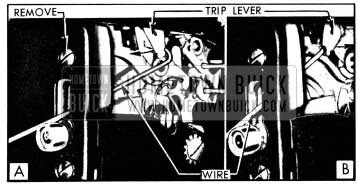
1950 Buick Free Wheeling Adjustments
To change lock from positive operation to free wheeling, place hook against near side of trip lever and push lever inward. See figure 13-3, view B.
1950 Buick Door Outside Handle Replacement
- Release the door rubber weatherstrip at the lock pillar face to expose flat spring handle retainer. NOTE: Some front doors have a weatherstrip support attached to door with two screws. Support must be removed after weatherstrip is released.
- Remove screw holding handle retainer to pillar face and pull retainer out until handle can be removed. See figure 13-4.
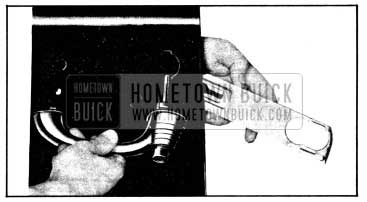
1950 Buick Removal of Door Outside Handle
1950 Buick Door Outside Safety Lock Replacement
- Remove door outside handle (subpar. c, above).
- Remove retaining snap ring, then remove stop washer, spring, and detent washer from handle; note the relative position of the stop and detent washers to insure correct reinstallation. See figure 13-5.
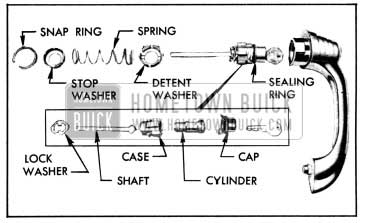
1950 Buick Handle and Outside Safety Lock
1950 Buick Door Lock Replacement
- Remove door outside handle (subpar. b, above), door trim pad (par. 13-18) and remove inspection hole cover from door inner panel below the lock.
- Disconnect the door lock remote control connecting rod from lock by removing the remote control mechanism.
- Remove inside locking rod. To remove locking rod on rear doors remove the single bolt and washer holding the inside locking rod lever to the door inner panel.
- On front door or rear door without ventilator or stationary glass, remove the glass run channel retaining screw on lower outer surface of door lock pillar facing.
- Remove lock attaching screws and lockwashers-two on door inner panel and three on lock pillar facing. See figure 13-6.
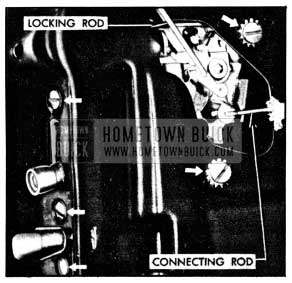
1950 Buick Door Lock Attaching Screws
When installing door lock remote control, attach it to door inner panel so that there is no end play in the connecting rod. Slotted screw holes permit this adjustment.
13-6 1950 BUICK DOOR AND REAR COMPARTMENT LID WEATHERSTRIPS
Description
A molded rubber weatherstrip, composed of several pieces, is cemented to the flange of each door. A sheet metal retainer attached to the door gives support to the weatherstrip along bottom edge of door. The retainer has a scalloped flange which is crimped over the base of weatherstrip after it is cemented in place. On rear doors, the weatherstrip is cemented to the face of door hinge pillar and is also supported by a sheet metal retainer attached to hinge pillar with screws.
On front doors the weatherstrip does not extend into the area between the hinges. In this area a bellows type sealing strip is cemented to the door and body hinge pillars in such position that it is not affected by the swinging movement of door.
The rear compartment lid is sealed by two molded rubber weatherstrips. The gutter weatherstrip is cemented across the top and part way down the sides into the gutter formed in body around the compartment opening. The lid weatherstrip is cemented to the lid flange along both sides and bottom.
Checking Contact of Weatherstrips
To avoid dust and water leaking through door or compartment lid openings, the weatherstrip must be in good condition and securely cemented to the metal surface on which it is mounted. The lip of the weatherstrip must make firm contact at all points. This can be checked by closing the door or lid on a slip of paper placed at intervals around the opening. If paper can be withdrawn, an adjustment of the door or lid may be necessary.
Moving the door or lid inward for closer contact of rubber weatherstrip against body may be accomplished by lock striker or hinge adjustment. If door or lid is in proper alignment in body opening, however, correction of air or water leak will probably require correction of rubber weatherstrip condition. If weatherstrip is loose or distorted it should be loosened sufficiently to permit proper adjustment and recementing. If damaged or deteriorated the weatherstrip should be replaced.
Cementing Weatherstrips
When re-cementing or replacing a rubber weatherstrip the following procedure must be used to insure permanent adhesion.
- Carefully remove old weatherstrip or portion to be re-cemented.
- Thoroughly clean surface of metal and surface of weatherstrip with a wire brush or with a cloth dampened with white. gasoline or oleum spirits. Do not use kerosene or other fluids containing oil.
- Allow surfaces to dry, then brush a coating of 3-M Weatherstrip Adhesive on mating surfaces of metal and weatherstrip.
- Keep coated parts separated and allow cement to air dry until “tacky,” which requires about 10 minutes. If parts are joined when cement is wet the weatherstrip will not adhere properly.
- Press weatherstrip firmly into place, being careful not to stretch it. When attaching weatherstrip along bottom of door be careful not to close drain holes in door inner panel.
- After weatherstrip is attached along bottom of a door crimp the scalloped flange of retainer over the base of weatherstrip. On a rear door, attach weatherstrip retainer to door hinge pillar with screws.
IMPORTANT: Do not close the door or lid for at least a half hour after re-cementing or installation of weatherstrip. If time permits, leave open for a longer period. If door or lid is closed before cement is thoroughly dry, the pressure against lid of weatherstrip may cause weatherstrip to pull away from its cemented base and early failure of the installation may result.
13-7 1950 BUICK DOOR ALIGNMENT; ADJUSTMENT OF DOOR HINGES AND CHECK LINKS
Checking 1950 Buick Door Fit in Body Opening
A door which is hard to open and close or which does not fit the door opening in body with even spacing all around and close flush with adjacent body panels should be carefully checked for fit in body opening before attempting any adjustment of hinges or door lock striker. Sometimes a combination of adjustments are required and time will be saved by checking as follows:
- Check for even contact of door rubber weatherstrip with body by closing door on a slip of paper placed at intervals around door. If paper can be withdrawn an adjustment of the door hinges, door lock striker or weatherstrip is indicated.
- Remove door lock striker to allow door to hang free on hinges without support from the dovetail wedge on door lock.
- Close the door and check the spacing of door in body opening at front, top and rear edges. The spacing should be uniform in width along each edge and should be approximately equal at all three edges.
- Check the belt molding or horizontal crease line at belt line of door and body. This should be in continuous alignment along the side of body from front edge of front door through the rear quarter panel.
- Hold door closed and check door flanges for being flush and in uniform alignment with adjacent body panels.
Careful consideration of door spacing, belt molding or crease line alignment, weatherstrip contact and door flange alignment will show whether correction can be made by adjustment of door lock striker or door hinges or a combination of both. It also will show whether the door or door opening requires truing up by other means than adjustment.
If hood is not in proper alignment with front doors, the hood should be adjusted; do not attempt to shift a properly fitting door to obtain alignment with the hood. Likewise, if door fits body opening properly, the fender rather than the door should be adjusted, if required, to secure proper alignment and clearance of these parts.
General Instructions for Adjusting 1950 Buick Door Hinges and 1950 Buick Door Lock Strikers
The following general instructions apply to all 1950 Buick doors. For specific instructions on adjustment of door hinges see subparagraph c.
Adjustment and fitting of a door in body opening should always start at the hinge side of door, with door lock striker removed to allow door to hang free on hinges.
Before making an adjustment at the hinges it is advisable to mark the location of hinge on body and door so that amount and direction of hinge movement can be measured as an aid in adjustment.
1950 Buick doors are heavy and hard to handle if all hinges are loosened during door adjustment and it may require the services of two men, one to hold the door at the correct adjustment while the other man tightens the hinge.
The in and out, or fore and aft adjustment may be simplified if only one door hinge at a time is loosened, adjusted and then tightened again.
To facilitate easy adjustment of the door up or down, use a car jack placed under the center of the door when it is in an open position. When the hinge screws are loosened, the jack may be operated to move the door up or down to the correct adjustment with very little effort, after which the screws may be tightened again.
In some cases it may be necessary to use a combination of vertical, in-and-out and fore-and aft adjustments to secure proper fitting of door in body opening and proper contact of door weatherstrip with body.
Alignment of door and body belt moldings or crease lines at hinge pillar should be obtained first, by vertical adjustment of door at hinges. Then align door flange so that it is flush with adjacent hinge pillar by an in or out adjustment of one or both hinges. Finally, obtain spacing of uniform width along hinge side which is approximately equal to spacing on lock side of door by fore or aft adjustment of one or both hinges.
When door is properly adjusted at hinge side, uniform spacing and also alignment of belt moldings or crease lines should exist at the lock side of door. In order to obtain alignment of moldings or crease lines at lock edge of door it may be necessary, in some cases, to adjust hinges so that door spacing on hinge side is not exactly uniform in width; however, the spacing must not be noticeably tapered on either the front, top or rear edges of door.
After door hinges have been adjusted for proper fit of door in body opening adjust the door lock striker, if necessary. Mark the position of striker on lock pillar with a pencil so that the amount of movement can be gauged, and so that its vertical position can be maintained. Loosening the attaching screws will permit in or out, up or down adjustment of the door lock striker. Serrations on the back of door lock striker and on the body pillar, coupled with anchor plate in body pillar, allow for these adjustments.
The door lock striker should be adjusted in or out to secure good contact of door weatherstrip with body and to permit positive locking of door lock bolt. The striker should be vertically adjusted so that the dovetail wedge and the lock bolt enter centrally into the guide channels of striker. The dovetail wedge and striker should support the lock side of door without upward or downward strain. NOTE: Striker must be maintained in a vertical position on lock pillar to insure proper contact with dovetail wedge and lock bolt.
1950 Buick Door Hinge Adjustments
Door hinge adjustments for up or down, in or out movement of door in body opening are provided by the slotted hinge attaching screw holes, which are in either the door or the body hinge pillar.
On front doors, slotted screw holes in the body hinge pillar provide up and down adjustment, and slotted screw holes in the door hinge pillar provide in and out adjustment.
On rear doors, slotted screw holes in the door hinge pillar provide up and down adjustment, and slotted screw holes in the body hinge pillar provide in and out adjustment.
Forward or rearward adjustment is not provided since this adjustment should not be required unless the hinges or door have been distorted by an accident. A bent hinge should be removed and straightened or replaced. A limited movement of door may be accomplished with shims, as follows:
To move a door rearward, place a thin full width waterproof cardboard shim between the hinge strap and body hinge pillar. Greater movement may be obtained, if necessary, by placing a narrow shim between the outer edge of hinge strap and body pillar to tilt the hinge and move door rearward.
To move a rear door forward, place a narrow waterproof cardboard shim between the inner edge of hinge strap and body pillar to tilt the hinge and move door forward. This method cannot be used on front doors.
All hinge attaching screws, except on door end of front door lower hinge, are accessible with door opened, after removal of the hinge cover plates which are attached with cross-recess screws. Before removal of hinge cover plates on rear doors it is necessary to loosen the weatherstrip and its retainer from the hinge area. See figure 13-7.
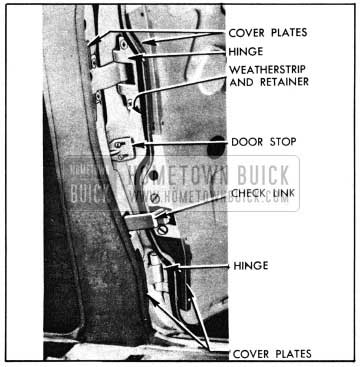
1950 Buick Rear Door Hinges, Cover Plates, and Weatherstrip
The attaching screws for door end of the front door lower hinge are covered by the sealing strip cemented to door pillar. To reach these screws, raise hood and work through the space between fender and cowl in front of door. Pry off the circular disc clip retaining the lower end of sealing strip to snap fastener on door pillar, then carefully loosen lower end of sealing strip to uncover hinge screws.
When door hinge adjustments are completed be sure to reinstall all hinge cover plates. Before installation on rear doors, fill the hinge depression at top and bottom of hinge strap with 3-M Autobody Sealer in the areas covered by the plates, also brush sealer on inner surfaces of cover plates. It is important to have joints around hinges water tight.
Recement weatherstrips and sealing strips where these have been loosened, and attach rear door weatherstrip retainers with screws. When recementing lower end of sealing strip to front door, first attach strip to fastener with a new disc clip and then press cemented area of strip to door pillar.
Front Door Check Link Adjustment or Replacement
The front door check link contains a pair of springs for counterbalancing and preventing the door from slamming shut. These springs also assist in opening the door, while the toggle action of the links establishes a definite hold open position. See figure 13-8. A non-adjustable stop mounted on the front face of door hinge pillar provides a definite stop for the fully opened position of door.
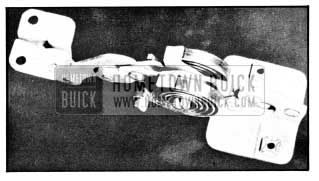
1950 Buick Front Door Check Link
The check link is furnished as a complete assembly only and is not adjustable except for its position on door inner panel. The assembly may be reached for adjustment or replacement by removing door trim pad (par. 13-18) and door inspection hole cover. The bolt holes in door inner panel are slotted to permit proper location of check link so that it will operate without binding.
Rear Door Check Link and Door Stop Adjustments or Replacement
The rear door check link consists of a stationary link anchored in the center body pillar and a support mounted on the door hinge pillar. The hooked rear end of the link extends through the support into the door so that when door is opened the hook engages the roller on the support to limit door opening. A tapered lug on the link acts as a hold-open stop to keep door from swinging shut. See figure 13-9.
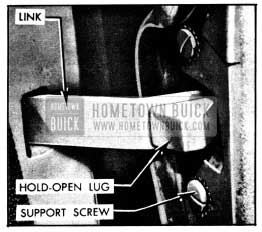
1950 Buick Rear Door Check Link
In addition to the check link, an adjustable door stop is mounted on the door hinge pillar about midway between the hinges. This stop is a wedge-shaped plate that can be moved in or out to adjust for fully opened position of door. See figure 13-7.
The check link support attaching screw holes are slotted so that support can be moved laterally to increase or decrease the hold open force. If sufficient hold open force cannot be secured by this adjustment, a shim may be placed between the link and center body pillar at point of attachment.
To replace the check link it is necessary to remove the body center pillar trim, (par. 13-22). The link is attached to pillar by one screw. To replace the support, remove door trim pad (par. 13-18) and inspection hole cover so that support can be removed through the inspection hole. After support is installed and adjusted seal the inspection hole cover when it is installed.
13-8 1950 BUICK REAR COMPARTMENT LID, HINGE, AND LOCK ADJUSTMENTS
Description of Hinges and Lock
The rear compartment lid is attached to the body by two concealed hinges. The strap portion of each hinge is attached to the inner panel of lid by bolts and floating anchor plates which permit adjustment of the lid in the body opening.
In some bodies, each compartment lid hinge contains a heavy coil spring for counterbalancing the lid and holding it in the fully opened position. In other bodies, the counterbalancing and hold open features are accomplished by torque rods which are attached between the hinges and the body.
The compartment lid is unlocked by the ignition key. When key is inserted in lock and turned clockwise the lock snaps the lid into an unlocked position from which it can be easily raised. The lid is locked by simply pushing it down-the lock automatically snaps into locked position. The key is not used when locking the lid.
The lid lock striker is mounted at lower edge of body opening in position to be engaged by the lock on compartment lid. Slotted bolt holes in striker permit adjustment to provide positive locking and proper pressure of lid against the weatherstrip.
Lid, Hinge, and Lock Striker Adjustments
Adjustment of rear compartment lid, hinges, and lock striker is required whenever an edge of lid is noticeably out of alignment with adjacent body panels, upper edge of lid contacts shoulder of body rear panel when lid is opened, or lid does not lock properly. Adjustment also may be required to correct dust or water leaks provided the weatherstrip is in good condition and securely cemented in place.
Before making any adjustment examine the fit of rear compartment lid in the body opening. The spacing along the top, bottom, and sides should be approximately equal and spacing along top edge of lid must be sufficient to prevent contact with shoulder on body panel when lid is raised. The edge of compartment lid should be fairly flush with adjacent body panels all around.
If spacing is objectionably unequal adjustment may be made by loosening hinge strap attaching screws and shifting lid in direction required. In some models a dowel pin mounted on lid engages a hole in a pilot bracket welded to body adjacent to lock striker. It may be necessary to shift the position of the dowel pin to obtain the required movement of compartment lid.
The spacing along top edge of lid may be correct but the lid contacts shoulder of body panel when lid is raised; this is because the hinge side of lid is set too low. On the other hand, the upper edge of lid may stand away from the body panel because it is set too high. Either condition may be corrected by shims placed between lid and hinge strap on side requiring adjustment. To raise edge of lid at either hinge, place a shim of proper thickness between lid and the forward end of hinge strap. To lower edge of lid, place shim at rear end of hinge strap.
After the hinge side of compartment lid is properly aligned, the lower or lock side of lid may be adjusted for alignment with body rear end panel and proper contact with weatherstrip by adjusting the lock striker up or down as required. The striker must not be set so low that the lock cannot snap into a securely locked position when lid is pressed down.
Some models have adjustable rubber bumpers on each side to steady the lid near the lower corners. These should be adjusted high enough to contact underside of lid when closed, but not so high that lid cannot contact the weatherstrip.
Replacement of 1950 Buick Rear Compartment Lid Lock
- Remove the four screws attaching the emblem base assembly to lid panel, working through access holes in lid inner panel. Carefully remove emblem base assembly, which is cemented to the rubber gasket which is also cemented to lid outer panel.
- The lock cylinder may be removed from emblem base assembly by removing the two retaining screws located in the open side of base.
- To remove the lid lock, remove lock screw, the four lock and cover plate screws, and the cover plate shown in figure 13-10. Lock assembly can then be removed from lid inner panel.
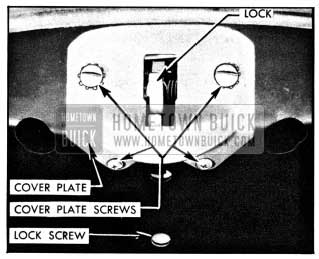
1950 Buick Lock Attaching Screws and Cover Plate
Replacement of 1950 Buick Rear Compartment Lid Hinge-Coil Spring Type
If it becomes necessary to remove a coil spring type lid hinge, protect body panel with suitable cover and provide a support for lid on side where hinge is to be removed. Scribe hinge strap location on lid inner panel then remove hinge strap attaching screws. Bend up the retaining tabs and remove the two hinge pins which extend through the hinge box.
When hinge is reinstalled be sure to place gasket between hinge strap and compartment lid inner panel. Adjust hinge to align compartment lid in body opening (subpar. b, above).
Replacement of 1950 Buick Rear Compartment Lid Hinge-Torsion Rod Type
- Open the rear compartment lid and brace it safely before attempting any work on the torque rods.
- Remove the screw and clip which attaches outer angle of torque rod to body.
- Place a short length of pipe over outer end of torque rod and lift the rod up and toward center of body to release it from the bracket. See figure 13-11.
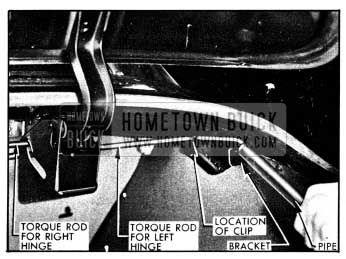
1950 Buick Removing Hinge Torque Rod
13-9 1950 BUICK INSTRUMENT PANEL COMPARTMENT (GLOVE BOX) LID AND LOCK
The instrument panel compartment door is attached to instrument panel by a butt-type double hinge and is provided with a separate curved stop to support the door in open position.
Where the hinge is attached to door the screw holes are slotted to permit adjustment of door in cross-body direction. Where the hinge is attached to instrument panel the screw holes are slotted to permit in-and-out adjustment of door.
The door is held in closed position by a lock with a sliding latch which engages a striker on instrument panel. When the lock cylinder is pushed inward the latch is retracted to unlatch the door. When lock cylinder is turned to locked position by means of the ignition key, the cylinder cannot be pushed inward to unlatch the door.
The door lock striker is adjustable to provide proper contact of upper corners of door with rubber bumpers mounted on instrument panel. The striker should be adjusted to prevent rattle but not tight enough to interfere with operation of the lock.
The lock assembly may be removed from the compartment door by removing screw and retainer on inside of door. The lock cylinder may be removed as follows:
- Insert key and turn to locked position.
- Insert a pointed tool into opening in lock barrel and push down and out on retaining tumbler (fig. 13-12) then remove cylinder.
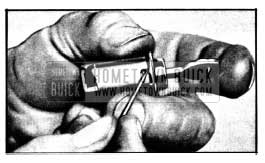
1950 Buick Removing Lock Cylinder

Leave A Comment
You must be logged in to post a comment.